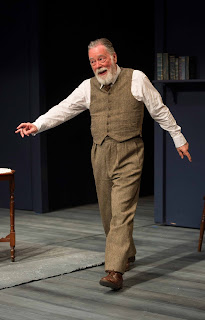Howard Brenton’s latest trip into history looks at the man best known as Lawrence of
Arabia - although as the title Lawrence After Arabia suggests, it doesn't
look at T.E. Lawrence's most famous deeds except in flashback. In fact most of the
action takes place in the home of George Bernard Shaw, where Lawrence (Jack Laskey)
liked to hide away from the press, despite the fact that his friend's own fame meant
reporters were rarely far away. Jeff Rawle plays Shaw, or possibly Captain Birdseye,
and Geraldine James his wife Charlotte, who takes on the job of editing Lawrence's
autobiography Seven Pillars of Wisdom, and discovers more in it than she'd
expected. John Dove, who's directed Brenton's work at the Globe before, now moves to
the playwright's other regular haunt on Hampstead's main stage, and a story that
opens with Lawrence a national hero after his victories in the Middle East during
World War I.
It's a fame and acclaim he's not entirely comfortable with, and he's dealing with it
in eccentric fashion by starting his military career from scratch, joining the RAF
under a pseudonym.
But with Field Marshall Allenby (William Chubb) on his case, and the American
journalist Lowell Thomas (Sam Alexander,) who documented his time in Arabia, trying
to profit from a series of lectures, his latest adventure doesn't look likely to
stay secret for long. With Lawrence now best known as the subject of the David Lean
film, Dove's production also aims for something of a cinematic sweep despite the
mostly domestic setting - Michael Taylor's set even opens up to widescreen for the
flashbacks to the desert. With this comes a wistful tone, a kind of nostalgia for an
early 20th century English eccentricity that mirrors the romanticised way Lawrence
thinks of the desert - despite Prince Feisal's (Khalid Laith) warnings against this.
But while the production is thoughtful, by Brenton's standards the story feels half-baked, especially in the first act where he struggles to decide what the real
focus of the story is, and it's hard to get a grip on the characters; those
flashbacks to Lawrence's desert exploits feel a bit like a loss of confidence in the
"After Arabia" conceit, and never quite work anyway. Things improve after the
interval when the play becomes mainly about the relationship between Lawrence and
Charlotte, who uncovers the ways he blames himself for the betrayal of the Middle
East by Britain and France after the war ended.
With the revelation of some invented sections in Lawrence's book, Laskey's geeky
charm proves a good match for a character hiding a self-flagellating side beneath
it, and there's some nicely observed scenes between him and James, their asexual
brand of romance given a no-nonsense counterpoint by Rosalind March's po-faced
secretary. But while it does uncover an interesting relationship and an unseen side
of the legendary war hero, Lawrence After Arabia never really comes to life.
Lawrence After Arabia by Howard Brenton is booking until the 4th of June at
Hampstead Theatre.
Running time: 2 hours 5 minutes including interval.
Photo credit: Tristram Kenton.




No comments:
Post a Comment